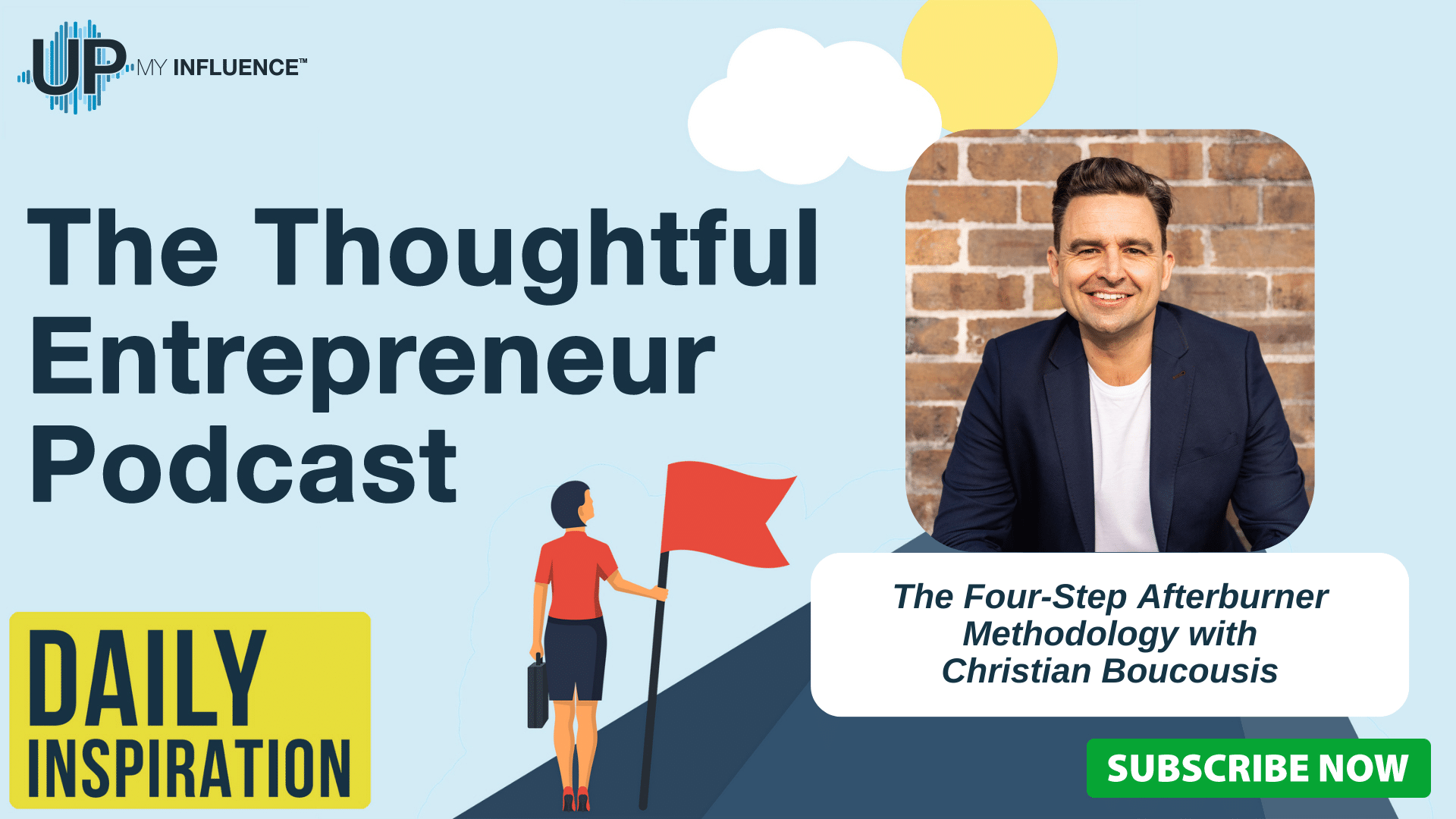THE THOUGHTFUL ENTREPRENEUR PODCAST
In this episode of the Thoughtful Entrepreneur, your host Josh Elledge speaks with the CEO of Afterburner Inc., Christian Boucousis.

Boo, a former fighter pilot, shed light on the Afterburner mindset, a concept deeply rooted in his experiences in the cockpit.
He explained that this mindset is not just about grit and determination, but also about analytical thinking and the ability to thrive in a fast-paced environment.
As a fighter pilot, Boo explained, everything happens quickly. There is a constant need to balance the unknown (the airplane's trajectory) with the known (the pilot's control). This mindset, he believes, is a blend of the art of strategy and the science of getting things done.
Boo emphasized the importance of storytelling and creating a compelling narrative in business. He drew parallels between the captivating narratives of “Lord of the Rings” and “Star Wars” and the often lackluster stories in the business world.
Afterburner, he explained, helps organizations create a high-definition destination, a clear and purposeful story that aligns everyone's actions.
Boo stressed the importance of debriefing in a supportive peer group, as they can help identify blind spots and provide valuable insights. He compared this process to cognitive behavioral therapy, where emotions are unpacked through action.
He also highlighted the significance of having a clear purpose and the need to achieve tangible results, as positive thoughts alone may not be enough.
Key Points from the Episode:
- Afterburner mindset and its connection to being a fighter pilot
- Importance of analytical thinking and working in a fast-paced environment
- The art of strategy and the science of getting things done
- Importance of storytelling and creating a compelling narrative in business
- Afterburner methodology: plan, brief, execute, and debrief
- ORCA process: Objective, Result, Cause, and Action
- Importance of debriefing in a supportive peer group
- Working with large enterprises and small/medium-sized businesses
- Afterburner offerings: keynotes, experiential programs, learning and development modules
About Christian Boucousis:
Christian Boucousis, widely known as “Boo,” serves as the CEO of Afterburner, a global human and organizational performance company. Renowned as a world-class keynote speaker, Boo employs a results-oriented approach that has left a lasting impact on individuals and organizations worldwide.
Boo's revolutionary “Evolutionary Way of Thinking” has transformed the approach to achieving immediate and sustained performance leaps, discarding outdated models.
His innovative concept of “Thought Loops” imparts fast-thinking, fast-acting skills to leaders and teams, fostering a growth mindset and enabling consistent surpassing of expectations.
With a proven track record, Boo has received countless positive reviews from satisfied clients, showcasing the tangible impact of his insights. His life story, marked by adaptability and reinvention, reflects his ability to succeed in adversity.
From fighter pilot to building a humanitarian business with a $200 million turnover and leading transformative projects, Boo's diverse experiences enrich his motivational speeches.
Boo's unique blend of expertise, energy, and passion positions him as an ideal keynote speaker for those seeking inspiration and empowerment.
Beyond providing tools for goal achievement, Boo inspires individuals to unlock their full potential, fostering positive impacts in both personal and professional spheres.
About Afterburner Inc:
Established in 1996, Afterburner Inc. pioneered integrating battlefield mission planning and strategic tactics into the corporate realm.
Comprising consultants with backgrounds in elite military teams and extensive business leadership experience, Afterburner has dedicated two decades to aligning strategy with daily activities and ensuring disciplined execution of mission-critical systems.
The company's renowned methodology and flawless Execution is a powerful force multiplier for organizations, facilitating alignment, focus, and effective execution of key leverage points.
As practitioners of a hands-on and embedded approach, Afterburner is committed to developing leaders, enhancing communication and collaboration, fostering agility, and instilling team and individual accountability through a shared mental model.
Beyond immediate engagements, Afterburner's goal is to contribute to the sustained success of organizations. With a mission to make client success its own, Afterburner remains a trusted partner in driving organizational excellence.
Tweetable Moments:
5:17 – “So if you start with known and unknown and you want to turn that into success, so the unknown is more the art of strategy. If we take those two states and we say yes, despite that being unknown, I still have to get things done and I still have to be successful.”
11:11 – “Self awareness is one of the hardest things to have. We want to be self aware, but at the same time we don't know how to do it.”
Apply to be a Guest on The Thoughtful Entrepreneur:
https://go.upmyinfluence.com/podcast-guest
Links Mentioned in this Episode:
Want to learn more? Check out Afterburner Inc. website at
Check out Afterburner Inc on LinkedIn at
https://www.linkedin.com/company/afterburner/
Check out Afterburner Inc on Twitter at
https://twitter.com/AfterburnerInc
Check out Afterburner Inc on Facebook at
https://www.facebook.com/AfterburnerIncPage/
Check out Afterburner Inc on Instagram at
https://www.instagram.com/afterburner_inc/
Check out Christian Boucousis on LinkedIn at
https://www.linkedin.com/in/christian-boo-boucousis/
Check out Christian Boucousis on Facebook at
https://web.facebook.com/christian.boucousis
Check out Christian Boucousis on Instagram at
instagram.com/christianbooboucousis
More from UpMyInfluence:
We are actively booking guests for our The Thoughtful Entrepreneur. Schedule HERE.
Are you a 6-figure consultant? I’ve got high-level intros for you. Learn more here.
What is your #1 Lead Generation BLOCKER? Take my free quiz here.
Want to learn more about all the podcasts managed by UpMyInfluence? Opt in here.

